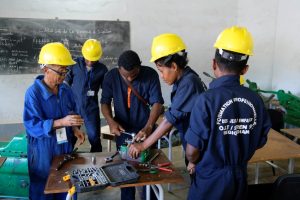Centre of Excellence for Leather (COEL) in Bangladesh (presentation)
Inglés
Otras fuentes
Los expertos de numerosos organismos nacionales, regionales e internacionales han tenido la generosidad de compartir sus opiniones, experiencias y conclusiones sobre las competencias, ayudando así a los responsables de políticas, entre otros actores, a entender los vínculos existentes entre la educación, la formación y el mundo del trabajo y la forma de integrar las competencias en la planificación del desarrollo nacional para promover el empleo y el crecimiento económico.

Acceso a la formación

El acceso de todos a una educación de calidad, a la formación profesional y a la formación en el puesto de trabajo es un principio fundamental de la cohesión social y el crecimiento económico. Algunos grupos de personas pueden requerir una atención específica para poder beneficiarse de las oportunidades de educación, formación y empleo.
Esto se aplica particularmente a los jóvenes desfavorecidos, los trabajadores menos calificados, las personas con discapacidad y aquellas que viven en comunidades rurales. El atractivo de la educación y formación profesionales se ve reforzado cuando se combina con formación empresarial y cuando las políticas públicas alientan la utilización de mayores competencias por parte de las empresas.
Prever las necesidades futuras en materia de competencias

Anticipación y adecuación de las necesidades en materia de competencias
Participación de los interlocutores sociales

El mundo de la enseñanza y el mundo del trabajo son independientes pero están interrelacionados. Mientras que el uno implica aprender, el otro produce bienes y servicios. Ninguno de los dos puede prosperar sin el otro. Las alianzas sólidas entre el gobierno, los empleadores y los trabajadores sirven para asegurar la adecuación de la formación a las necesidades cambiantes de las empresas y los mercados laborales.
Materiales de promoción
Presentaciones, documentos de trabajo, informes de reuniones, material divulgativo, vídeos, fichas descriptivas, folletos y boletines informativos sobre el desarrollo de competencias para el empleo.

Aprendizajes
Consejos de competencias industriales
Industria del cuero
Colaboraciones del sector público con el sector privado
Prever las necesidades en materia de competencias
Desajuste de competencias
Mujeres
Juventud
Bangladesh
Bangladesh has a strong track record of growth and development, even in times of elevated global uncertainty. A robust demographic dividend, strong ready-made garment exports, resilient remittance inflows, and stable macroeconomic conditions have supported rapid economic growth over the past two decades. A strong recovery from the COVID-19 pandemic continued in FY22, although a recent surge in commodity prices has presented new headwinds.
Bangladesh reached lower-middle income status in 2015. It is on track to graduate from the UN’s Least Developed Countries list in 2026. Poverty declined from 43.5 percent in 1991 to 14.3 percent in 2016, based on the international poverty line of $1.90 a day (1).
Like many of its Asian neighbours, Bangladesh faces a major challenge trying to develop modern, employability skills for tens of millions of young women and men. It has a large informal sector, which accounts for 94.7 percent of the total employment in 2017 (2). Youth continue to be highly affected by the lack of opportunities, with the share of youth aged 15-24 not in employment, education or training (NEET), estimated at 27.8 percent in 2020 (3).
TVET has a huge role to play in equipping the vast young labour force of 15-29 years referred to as the country’s “demographic dividend” with employability skills and providing enhanced support services to ensure a better transition from school to work. TVET may also contribute to reducing poverty by providing employability skills, particularly to those who drop out of school early and to a large number of unemployed and underemployed adults.
Despite many reform initiatives by the government, the TVET sector needs further strengthening through reform of policies and systems in the labour market. Enhancing industry-relevance of TVET qualifications will furthermore require closer Government cooperation with the private sector. For one and a half decade, the ILO has worked closely with the Government of Bangladesh and its Social Partners to reform the TVET sector and to improve access for people to increase their skills and employability, in particular youth, women and people from other marginalized groups.
The impact of the COVID-19 pandemic had detrimental effects on the TVET sector, due to the nation-wide closure of all educational institutes for one and a half years, starting on 17 March 2020. Most students’ learning was effectively abolished for this duration, and learning and certification was only possible through limited online learning facilities in existence at the time. Only recently has the TVET returned to its prior activity level.
The ILO landmark programmes aim to strengthen and improve the environment for industry skills development, address the mismatch between the supply and demand for skills training, and drive the increased employability of millions of young women and men. ILO’s support to develop the skills system in Bangladesh has focused on skills system governance, development of skills policies and qualifications frameworks; delivery of quality skills training, expanding access to TVET, and involvement by the private sector.
Sources
(1) https://www.worldbank.org/en/country/bangladesh/overview
(2) https://ilostat.ilo.org/topics/informality/
(3) https://ilostat.ilo.org/topics/youth/
Country Assessment and Priority (CAP) – Bangladesh strategy for skills and lifelong learning (2022)
Situation Analysis of Bangladesh TVET Sector (2019) https://www.ilo.org/wcmsp5/groups/public/—asia/—ro-bangkok/—ilo-dhaka/documents/publication/wcms_735704.pdf_